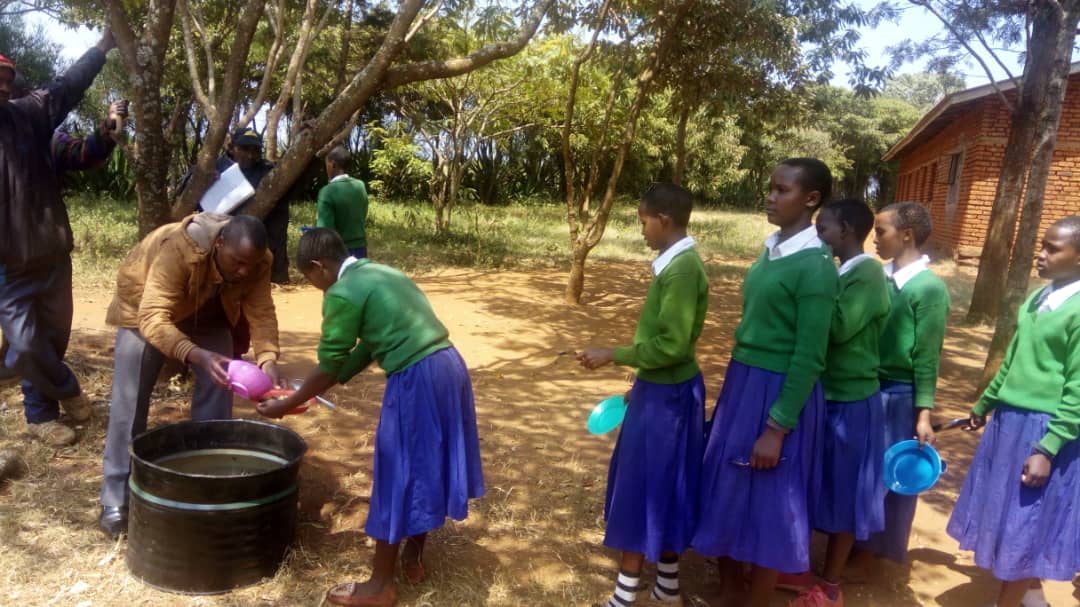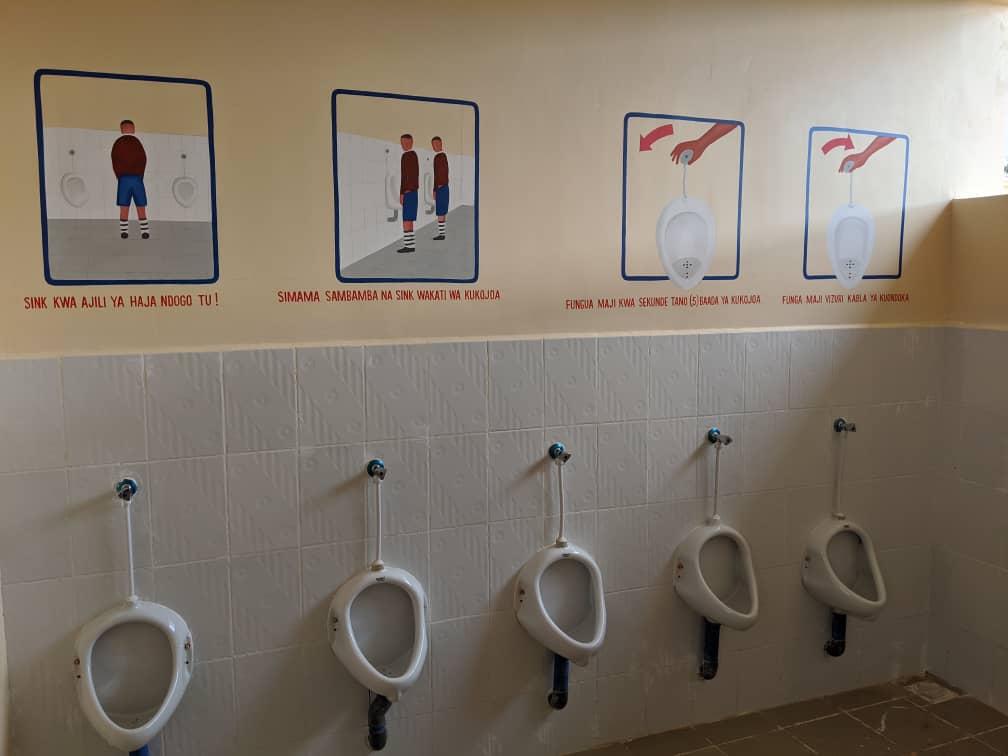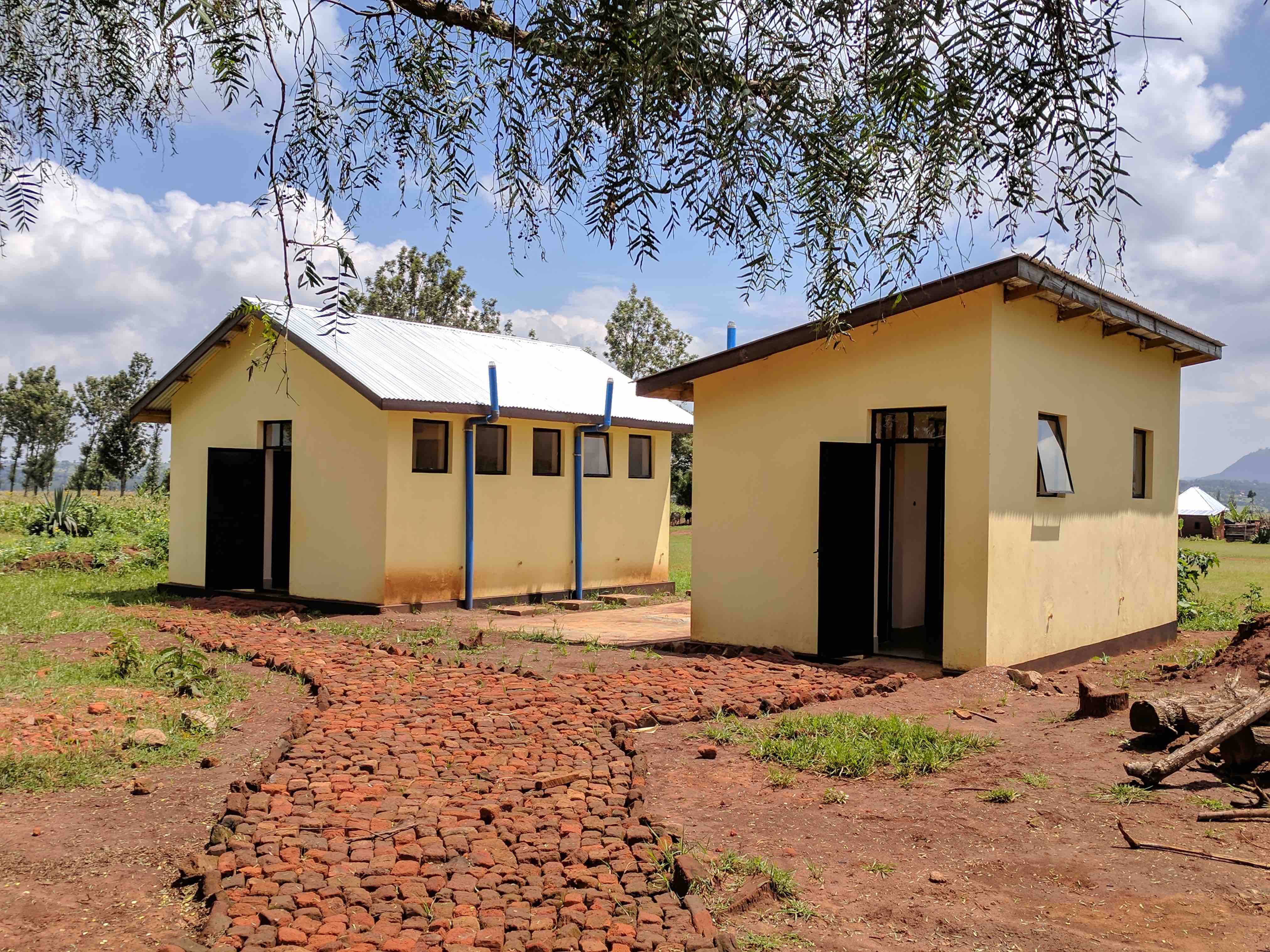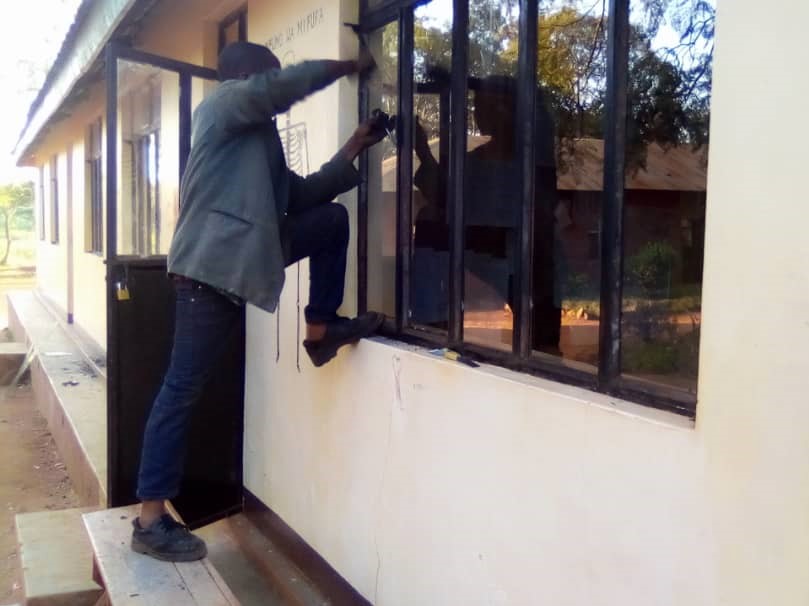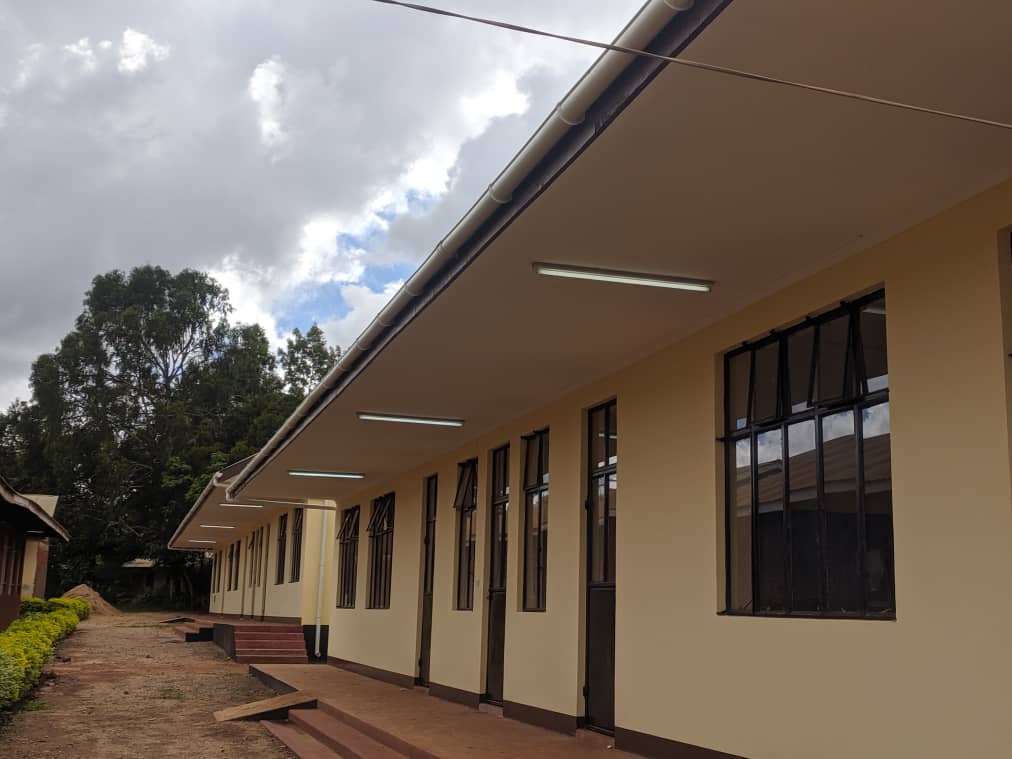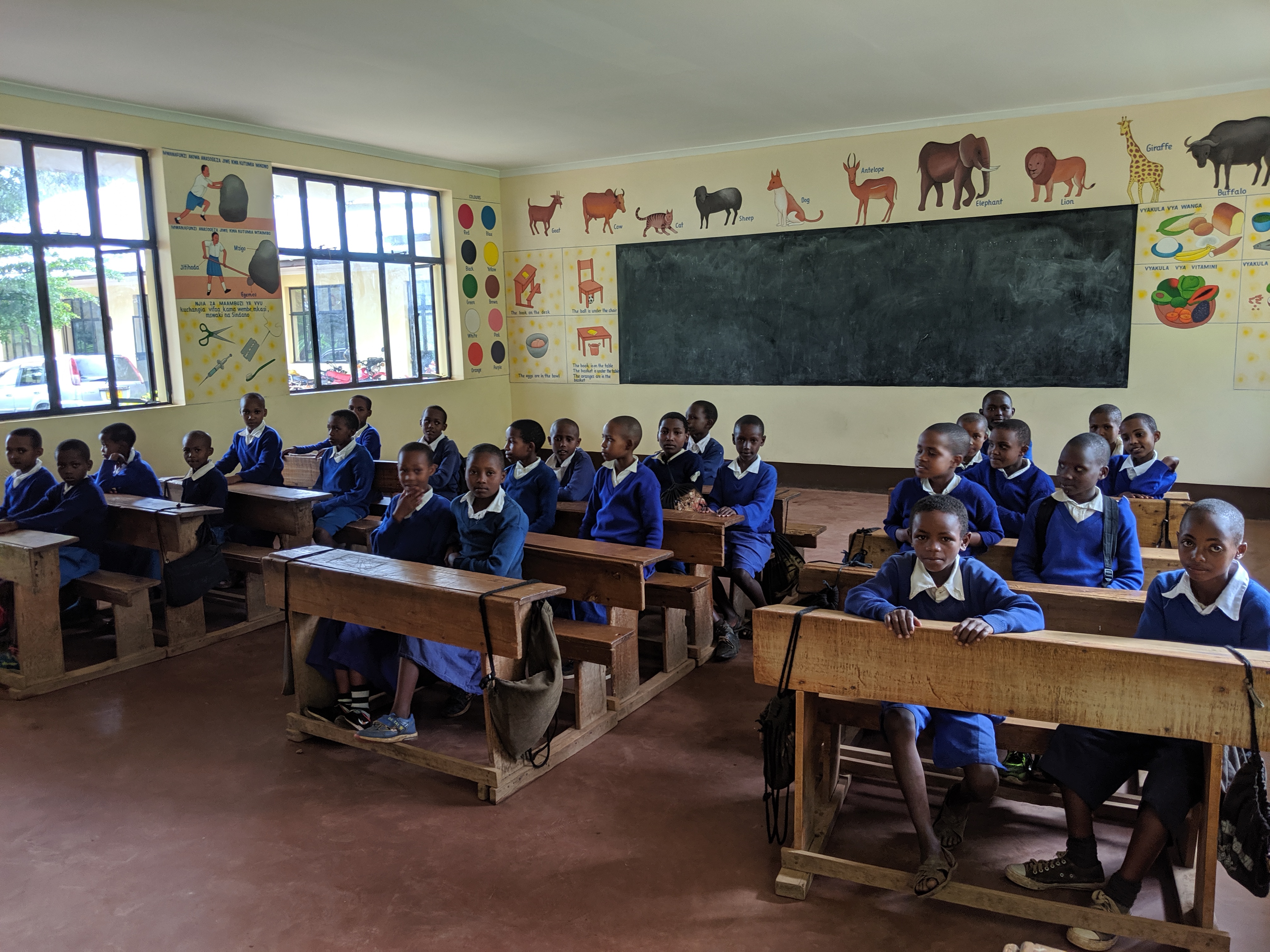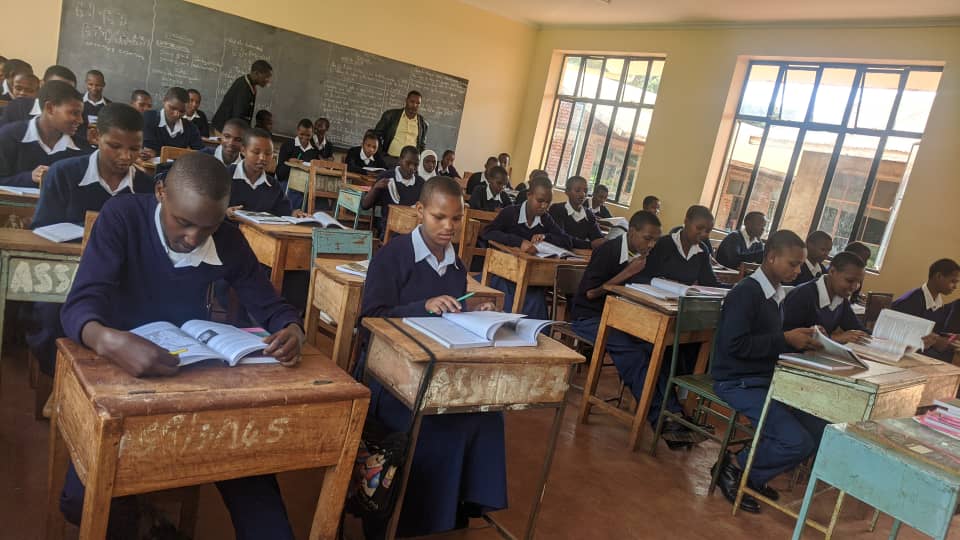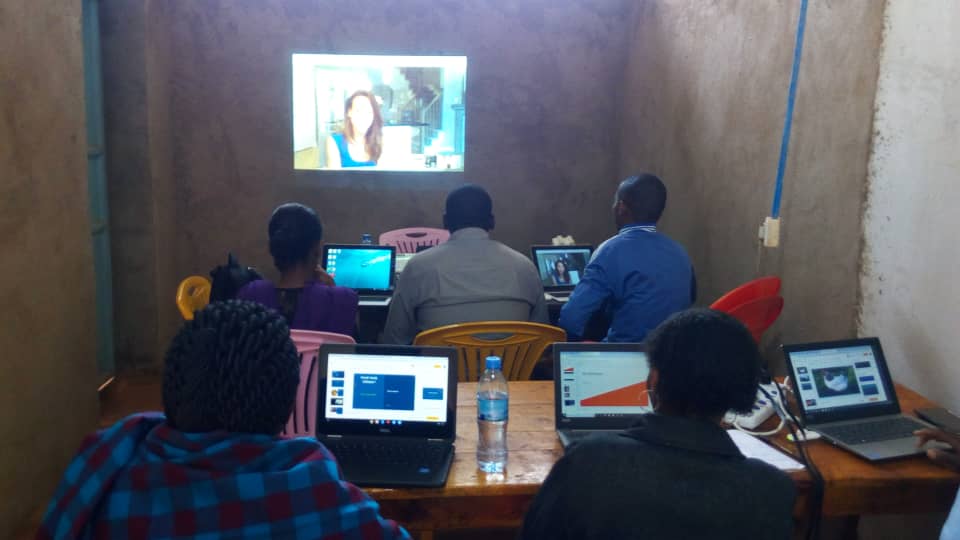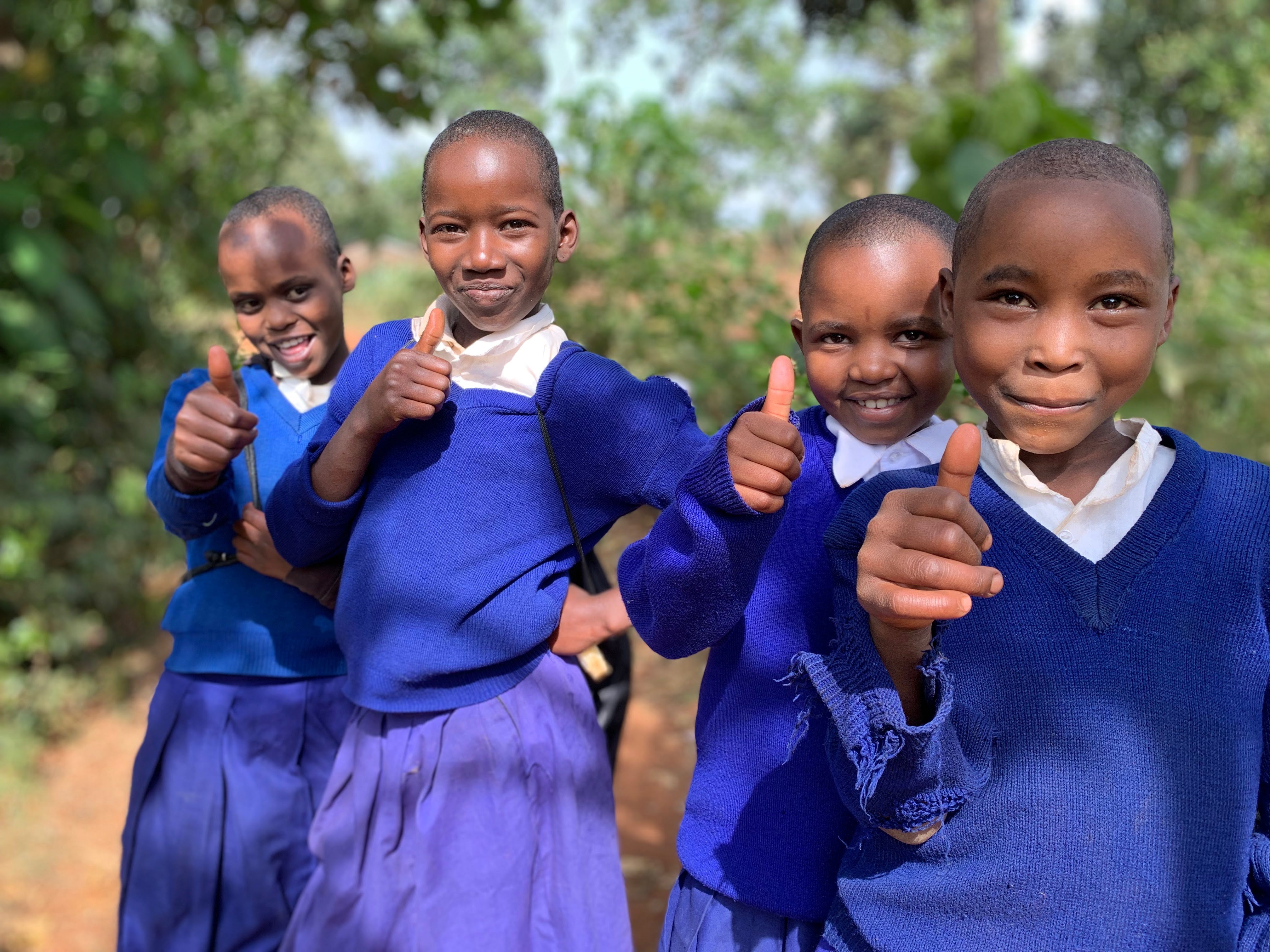
Karimu Education Program
Karimu’s mission to fight poverty in rural villages in the developing world necessitates our investment in forward looking development of schools, educational support, and programs for students and teachers. Because children represent the most salient prospects for future wealth in any community, educational projects have a high priority in Karimu’s planning and community building. The education program encompasses construction of adequate classrooms for the school population; sufficient school materials; construction of bathrooms and provision of hygiene supplies for children; efforts to attract and retain good teachers via initiatives that expand teacher housing, enhanced professional development, exposure to hands-on interactive learning projects and access to technology that can benefit classroom learning; and, creating conditions that increase enrollment, improve learning, and expand and complement local education through special enrichment projects (for example art, interactive education, science projects, the pen pal project). Taken together they are intended to improve the education and lives of children and expand the prospects of future participation in higher education.
Background
Education in Tanzania starts with one or two years of optional pre-primary education or kindergarten. After kindergarten, the Tanzanian educational system operates on the 7-4-2 system: 7 years of primary school, followed by 4 years of secondary school (Ordinary Level) leading to 2 years of Advanced Level (High School). Schools are free and primary school is compulsory for every child. Unfortunately, many children do not attend school because their families often cannot afford the cost of uniforms, the financial contributions to the school, or simply to lose the extra hand to work at home or the agricultural fields.
At the end of each of these 7-4-2 phases, the student is required to take a national exam and is allowed to continue studying only after passing the exam.
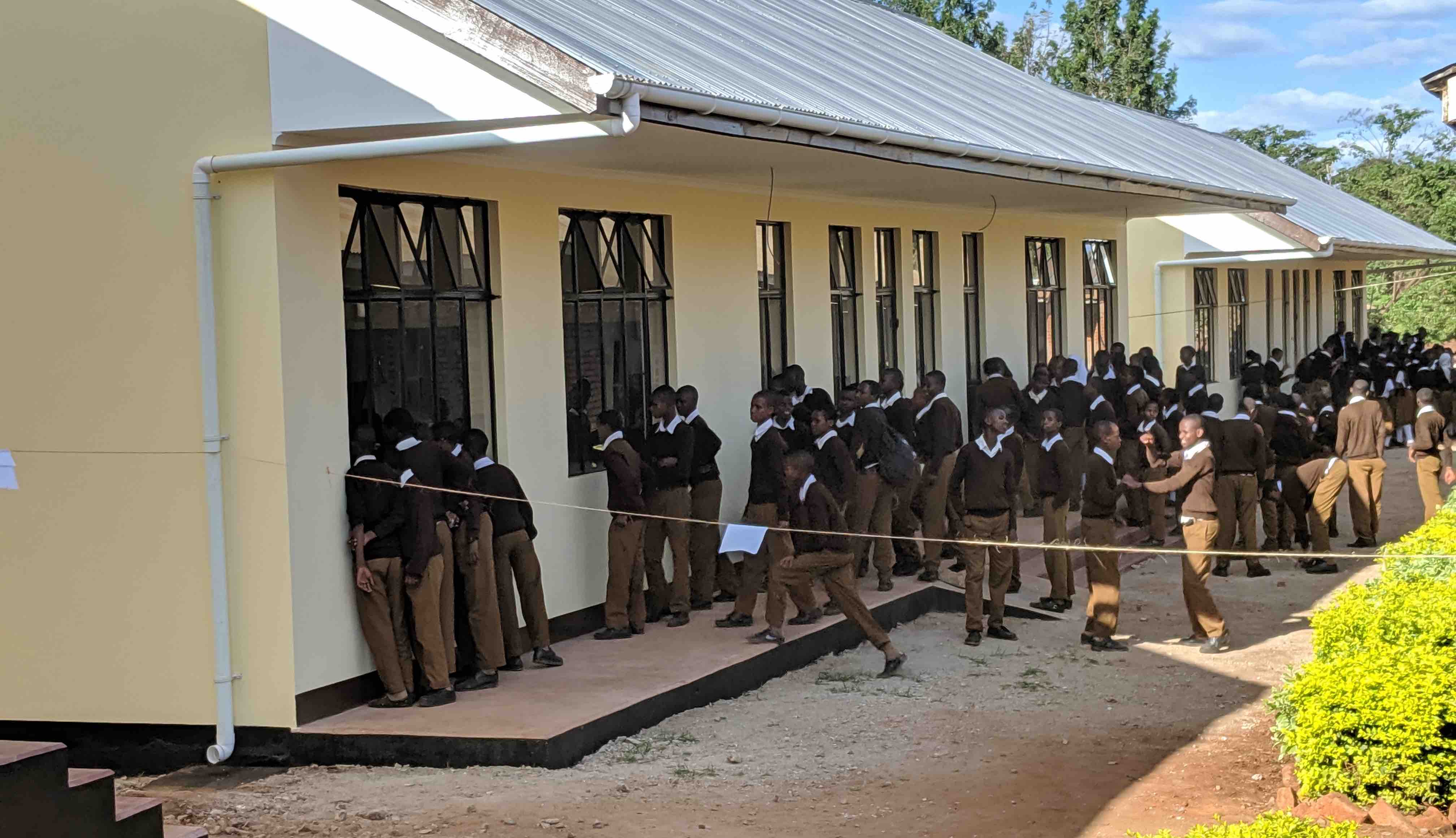
caption
After the 13th year of secondary school students may take the Advanced Degree exam and attend a technical school, college, or university.
Primary school curriculum includes Mathematics, English, Geography, Science, History, and Civics. Students are instructed in Swahili, the national language, and take English as a foreign language. Secondary School students are only taught in English.
Teachers in Tanzania may have one of the following three qualifications:
- Certificate: Teachers who are trained to teach pre-primary and primary school students. The teacher Certificate course is a two-year training program for students who passed the national examination at the end of secondary school with a minimum qualification. The training emphasises teaching methods.
- Diploma: A teacher Diploma training is required to teach in secondary schools, although most will also teach in primary schools. A Diploma in Education is a 2-year course for students who achieve a minimum qualification in the national examination at the end of high school. The training emphasises teaching methods and ethics.
- Degree: A Degree program is available to the students who achieve a higher qualification in the national examination at the end of high school. Normally, Degree holders are trained to teach in secondary schools and teacher training colleges. The Training takes three to four years with a focus on teaching methods and education psychology as well as specialization in a few academic subjects such as physics or history.
The government of Tanzania is in the process of requiring that all teachers obtain at least the Diploma level with strong incentives to reach the Degree level.
Goals
The main objectives of the Karimu Education Program are:
- Improve overall academic performance
- Achieve parity between boys and girls
- Increase primary school enrollment
- Improve attendance
- Reduce dropout rates, particularly among girls
- Increase secondary & high school enrollment, particularly among girls
Karimu’s development goals and activities for the Education Program are tied to the following components:
- Construction, renovation and expansion of sanitation at schools including student and teacher toilets, clean water, and handwashing sinks
- Construction, reconstruction and expansion of classrooms and school facilities including basic electricity
- Kitchens for school lunches
- Educational materials and supplies (textbooks, reference books/library, lab equipment)
- Enrichment and sports supplies
- Teacher housing
- Teacher training and enrichment projects and scholarships
- Computer training
- Hygiene training
Whenever possible, Karimu will offer other activities in support of students, teachers and the school. These can include teachers training , classes run by Karimu volunteers, donation of school materials, donation of clothes and shoes to children most in need, or other activities that have been identified as helpful to the support of schools and to Karimu’s relationship with the community. As these are not part of Karimu’s regular education program, Karimu cannot guarantee that such activities will be offered indefinitely.
Overview of the Program
There are four phases to the Karimu Education Program.
- Creating a healthy school: The health and well-being of the communities Karimu works with is of the utmost importance and our first priority. Clean water, suitable toilets and hand washing stations all contribute to a safe and healthy educational environment for the students and teachers. Teaching the basics of health and hygiene to all students and first aid to the teachers will help the students stay well and concentrate on their studies. In addition, all Karimu school projects require the local community to provide school lunches to all children in school improving nutrition.
- Building an adequate learning environment: Karimu, in partnership with the community, renovates or builds classrooms, provides new blackboards, installs basic electricity, and builds dining halls and kitchens.
- Promoting academic excellence: Karimu is dedicated to empowering teachers in their pursuit of improved student learning and engagement. To this end, Karimu will provide resources identified by the teachers and school administration to support their educational goals such as construction of a school library, donation of books, sports, and arts material.
- Supporting teachers’ excellence: Competent, capable and committed educators are essential to the continued improvement of classroom instruction and the overall academic success. Karimu believes that highly qualified teachers transform lives and, for this reason, provides scholarships to teachers earning their university Degrees or Diploma by covering 75% of the cost (the teachers are responsible for paying the remaining 25%). Teachers with this advanced level of education provide leadership and professionalism in their schools and their communities. Additionally, we provide training on current instructional strategies , educational best practices and computer technology. Finally, vast numbers of teachers across Africa, because of their education and professional status, are reluctant to live in the mud huts occupied by most residents of remote, rural areas. By building modest but modern housing , which includes plumbing for flush toilets and sinks, Karimu ensures the retention of these highly qualified teachers.
Phases
The four phases of the Karimu Education Program is detailed below. However, these phases don’t necessarily need to be executed in sequence. As soon as the pre-conditions of a certain phase are met, the school is entitled to request that Karimu starts that phase.
Phase 1. Creating a Healthy School
Karimu will work with the community to build adequate sanitation facilities for the school such as availability of clean water and appropriate bathroom as well as with the school to teach the basics of health and hygiene to all students and first aid to the teachers.
Pre-conditions:
- Every student receives a meal at school.
caption
- Agreement by School and School Committee to their obligations below plus those included in the Karimu Strategic Plan (e.g., funding for construction projects).
Karimu:
- Provide the availability of clean water at no more than 100m from school
- Construct water sink with one faucet for every 50 students
- Construct bathrooms for girls, boys, and staff with
stalls with flush toilets (1:20 for girls and 1:25 for boys plus urinals)
water faucet for cleaning
tiled floor
enough light and ventilation
girls’ bathroom with access to incinerators and private wash area
caption
- Provide First Aid kit and training
- Provide hand washing guidelines
School:
- Run a refresher of good hygiene practices to all school children and staff that includes the proper use of bathroom facilities at least once a year
- Ensure proper daily cleaning of bathroom facilities
- Ensure the availability of menstrual pads to all girls at school
- Construction of walking paths to toilets to facilitate access during the rainy season
caption
- Commits to improve the passing rate on the National Exam until it reaches the passing rate required (see Appendix A “Passing Rate Requirement”)
- School must nominate at least one teacher to be trained by Karimu on First Aid
- Teachers commit to attend school daily unless sick or have permission.
- Record student attendance each morning and again after lunch.
- Promote hand washing and good hygiene practices at the bathrooms.
- Encourage boys and girls to pursue their education and successfully complete secondary school.
- Maintain the buildings, assets, and facilities ensuring that all repairs are completed within one month.
- Educate boys and girls about bad effects of early pregnancy.
School Committee/Community:
- Commit to improve the passing rate on the National Exam until it reaches the passing rate required (see Appendix A “Passing Rate Requirement”)
- Commit to improve attendance rate to reach 90% or higher.
- Provide funds to the school to maintain the buildings, assets, and facilities ensuring that all repairs are completed within one month.
caption
Phase 2. Building an Adequate Learning Environment
In partnership with the community, Karimu will renovate and/or build classrooms, provide new blackboards, provide basic electricity and build kitchens.
Pre-conditions:
- Commitments made by the school and school committee/community in phases already completed at the school have been met.
- Passing rate on the National Exam is above 50% or at least 20% better than the previous year for the last three years.
- Student and teacher attendance rate above 90%.
Karimu:
- Construct enough classrooms to reach a ratio of at most 45 students per classroom with the following features:
Construction from bricks and/or concrete
Concrete flooring
Large windows for enough light and that can be closed to keep out rain _
_Doors that can be locked _
_Roofing
Blackboards
caption
- Create availability of electricity in at least one room for charging small devices (e.g., mobile phones) and for light at night
- Construct kitchen with fuel-efficient stoves for school to cook at least lunch for students
- Construct a dining hall with capacity to host students receiving meals at school
- Construct hostel for boys and girls (secondary school only)
School:
- Ensure proper cleaning of school facilities
caption
- Maintain the buildings, assets, and facilities ensuring that all repairs are completed within one month.
School Committee/Community
- Provide desks for students to reach and maintain a ratio of 2:1
- Provide one cupboard plus one chair and desk for teacher for each classroom
- Provide funds to the school to maintain the buildings, assets, and facilities ensuring that all repairs are completed within one month.
Phase 3. Promoting Academic Excellence
Karimu will provide resources usually missing in rural schools: school library, books, sports, and arts material.
Pre-conditions:
- Commitments made by school and school committee/community in phases already completed at the school have been met.
Karimu
- Availability of a school library
- One-time donation of books to reach a ratio of 2 students:1 book in all subjects at primary schools and 1:1 for secondary schools.
caption
- One-time donation of soccer, netball and volleyballs as well as volleyball and netball nets
- One-time donation of one set of drums and six flutes .
School
- Availability of sports class
- Insure the proper use of the sports material/equipment
- Oversee the use of the library allowing kids to borrow books
School Committee/Community
- Replacement of books and acquisition of new ones as the number of students grow, maintaining a ratio of 2 students:1 book at primary schools and 1:1 at secondary schools
- Provide shelves for the library
- Provide goals for the soccer field and posts for volleyball net
Phase 4. Supporting Teachers’ Excellence
All parents send their children to school with the hope that teachers will equip their kids with the skills necessary for a better life. Karimu will invest in enhancing the qualification of teachers and in their retention to ensure the overall improvement of the students’ performance.
Pre-Conditions:
- Commitments made by school and school committee/community in phases already completed at the school have been met.
- Passing rate on the National Exam reaches the passing rate required (see Appendix A “Passing Rate Requirement”)
Karimu:
- Provide scholarship for teachers further development/education in a diploma or degree program. Karimu will cover 75% of the university cost and the teacher 25%.
- Construct adequate teachers’ housing .
- Create a technology center and train the teachers in computer skills.
- Provide a computer, printer, and copy machine following successful completion of the computer training.
School:
- Ensure teacher participation in the computer training
- Ensure proper use of computer, printer, copy machine
caption
School Committee/Community:
- Provide funds for supplies for computer, printer, and copies (ink, paper, etc.) and for maintenance/repair within one month
Current Program Status (October 2023)
The table below shows the status of Karimu Education Program in the ward (similar to a county) of Ayalagaya, state of Manyara, Tanzania.
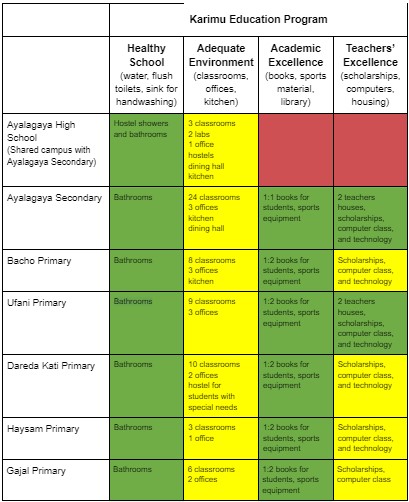
The table below shows the status of Karimu Education Program in the county of Arri, state of Manyara, Tanzania
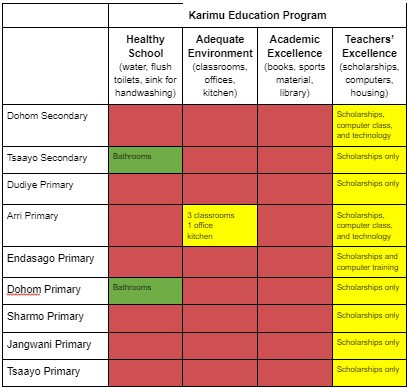
Note: Now that Karimu has completed the water project in Arri Ward, it can address the sanitation challenges of its schools.
Appendix A Passing Rate Requirement
Because one of the biggest challenges faced by schools in Tanzania is the lack of teachers, the expected passing rate of the children of a given school in the National Exam varies according to the number of students per teacher.
- If the number of students per teacher is >= 76, then the passing rate should be >= 50%.
- If the number of students per teacher is between 61 and 75, then the passing rate should be >= 70%.
- If the number of students per teacher is between 51 and 60, then the passing rate should be > = 80%.
- If the number of students per teacher is < = 50, then the passing rate should be >= 90%.
Karimu Education Program
Karimu’s mission to fight poverty in rural villages in the developing world necessitates our investment in forward looking development of schools, educational support, and programs for students and teachers. Because children represent the most salient prospects for future wealth in any community, educational projects have a high priority in Karimu’s planning and community building. The education program encompasses construction of adequate classrooms for the school population; sufficient school materials; construction of bathrooms and provision of hygiene supplies for children; efforts to attract and retain good teachers via initiatives that expand teacher housing, enhanced professional development, exposure to hands-on interactive learning projects and access to technology that can benefit classroom learning; and, creating conditions that increase enrollment, improve learning, and expand and complement local education through special enrichment projects (for example art, interactive education, science projects, the pen pal project). Taken together they are intended to improve the education and lives of children and expand the prospects of future participation in higher education.
Background
Education in Tanzania starts with one or two years of optional pre-primary education or kindergarten. After kindergarten, the Tanzanian educational system operates on the 7-4-2 system: 7 years of primary school, followed by 4 years of secondary school (Ordinary Level) leading to 2 years of Advanced Level (High School). Schools are free and primary school is compulsory for every child. Unfortunately, many children do not attend school because their families often cannot afford the cost of uniforms, the financial contributions to the school, or simply to lose the extra hand to work at home or the agricultural fields.
At the end of each of these 7-4-2 phases, the student is required to take a national exam and is allowed to continue studying only after passing the exam.

caption
After the 13th year of secondary school students may take the Advanced Degree exam and attend a technical school, college, or university.
Primary school curriculum includes Mathematics, English, Geography, Science, History, and Civics. Students are instructed in Swahili, the national language, and take English as a foreign language. Secondary School students are only taught in English.
Teachers in Tanzania may have one of the following three qualifications:
- Certificate: Teachers who are trained to teach pre-primary and primary school students. The teacher Certificate course is a two-year training program for students who passed the national examination at the end of secondary school with a minimum qualification. The training emphasises teaching methods.
- Diploma: A teacher Diploma training is required to teach in secondary schools, although most will also teach in primary schools. A Diploma in Education is a 2-year course for students who achieve a minimum qualification in the national examination at the end of high school. The training emphasises teaching methods and ethics.
- Degree: A Degree program is available to the students who achieve a higher qualification in the national examination at the end of high school. Normally, Degree holders are trained to teach in secondary schools and teacher training colleges. The Training takes three to four years with a focus on teaching methods and education psychology as well as specialization in a few academic subjects such as physics or history.
The government of Tanzania is in the process of requiring that all teachers obtain at least the Diploma level with strong incentives to reach the Degree level.
Goals
The main objectives of the Karimu Education Program are:
- Improve overall academic performance
- Achieve parity between boys and girls
- Increase primary school enrollment
- Improve attendance
- Reduce dropout rates, particularly among girls
- Increase secondary & high school enrollment, particularly among girls
Karimu’s development goals and activities for the Education Program are tied to the following components:
- Construction, renovation and expansion of sanitation at schools including student and teacher toilets, clean water, and handwashing sinks
- Construction, reconstruction and expansion of classrooms and school facilities including basic electricity
- Kitchens for school lunches
- Educational materials and supplies (textbooks, reference books/library, lab equipment)
- Enrichment and sports supplies
- Teacher housing
- Teacher training and enrichment projects and scholarships
- Computer training
- Hygiene training
Whenever possible, Karimu will offer other activities in support of students, teachers and the school. These can include teachers training , classes run by Karimu volunteers, donation of school materials, donation of clothes and shoes to children most in need, or other activities that have been identified as helpful to the support of schools and to Karimu’s relationship with the community. As these are not part of Karimu’s regular education program, Karimu cannot guarantee that such activities will be offered indefinitely.
Overview of the Program
There are four phases to the Karimu Education Program.
- Creating a healthy school: The health and well-being of the communities Karimu works with is of the utmost importance and our first priority. Clean water, suitable toilets and hand washing stations all contribute to a safe and healthy educational environment for the students and teachers. Teaching the basics of health and hygiene to all students and first aid to the teachers will help the students stay well and concentrate on their studies. In addition, all Karimu school projects require the local community to provide school lunches to all children in school improving nutrition.
- Building an adequate learning environment: Karimu, in partnership with the community, renovates or builds classrooms, provides new blackboards, installs basic electricity, and builds dining halls and kitchens.
- Promoting academic excellence: Karimu is dedicated to empowering teachers in their pursuit of improved student learning and engagement. To this end, Karimu will provide resources identified by the teachers and school administration to support their educational goals such as construction of a school library, donation of books, sports, and arts material.
- Supporting teachers’ excellence: Competent, capable and committed educators are essential to the continued improvement of classroom instruction and the overall academic success. Karimu believes that highly qualified teachers transform lives and, for this reason, provides scholarships to teachers earning their university Degrees or Diploma by covering 75% of the cost (the teachers are responsible for paying the remaining 25%). Teachers with this advanced level of education provide leadership and professionalism in their schools and their communities. Additionally, we provide training on current instructional strategies , educational best practices and computer technology. Finally, vast numbers of teachers across Africa, because of their education and professional status, are reluctant to live in the mud huts occupied by most residents of remote, rural areas. By building modest but modern housing , which includes plumbing for flush toilets and sinks, Karimu ensures the retention of these highly qualified teachers.
Phases
The four phases of the Karimu Education Program is detailed below. However, these phases don’t necessarily need to be executed in sequence. As soon as the pre-conditions of a certain phase are met, the school is entitled to request that Karimu starts that phase.
Phase 1. Creating a Healthy School
Karimu will work with the community to build adequate sanitation facilities for the school such as availability of clean water and appropriate bathroom as well as with the school to teach the basics of health and hygiene to all students and first aid to the teachers.
Pre-conditions:
- Every student receives a meal at school.
caption
- Agreement by School and School Committee to their obligations below plus those included in the Karimu Strategic Plan (e.g., funding for construction projects).
Karimu:
- Provide the availability of clean water at no more than 100m from school
- Construct water sink with one faucet for every 50 students
- Construct bathrooms for girls, boys, and staff with
stalls with flush toilets (1:20 for girls and 1:25 for boys plus urinals)
water faucet for cleaning
tiled floor
enough light and ventilation
girls’ bathroom with access to incinerators and private wash area
caption
- Provide First Aid kit and training
- Provide hand washing guidelines
School:
- Run a refresher of good hygiene practices to all school children and staff that includes the proper use of bathroom facilities at least once a year
- Ensure proper daily cleaning of bathroom facilities
- Ensure the availability of menstrual pads to all girls at school
- Construction of walking paths to toilets to facilitate access during the rainy season
caption
- Commits to improve the passing rate on the National Exam until it reaches the passing rate required (see Appendix A “Passing Rate Requirement”)
- School must nominate at least one teacher to be trained by Karimu on First Aid
- Teachers commit to attend school daily unless sick or have permission.
- Record student attendance each morning and again after lunch.
- Promote hand washing and good hygiene practices at the bathrooms.
- Encourage boys and girls to pursue their education and successfully complete secondary school.
- Maintain the buildings, assets, and facilities ensuring that all repairs are completed within one month.
- Educate boys and girls about bad effects of early pregnancy.
School Committee/Community:
- Commit to improve the passing rate on the National Exam until it reaches the passing rate required (see Appendix A “Passing Rate Requirement”)
- Commit to improve attendance rate to reach 90% or higher.
- Provide funds to the school to maintain the buildings, assets, and facilities ensuring that all repairs are completed within one month.
caption
Phase 2. Building an Adequate Learning Environment
In partnership with the community, Karimu will renovate and/or build classrooms, provide new blackboards, provide basic electricity and build kitchens.
Pre-conditions:
- Commitments made by the school and school committee/community in phases already completed at the school have been met.
- Passing rate on the National Exam is above 50% or at least 20% better than the previous year for the last three years.
- Student and teacher attendance rate above 90%.
Karimu:
- Construct enough classrooms to reach a ratio of at most 45 students per classroom with the following features:
Construction from bricks and/or concrete
Concrete flooring
Large windows for enough light and that can be closed to keep out rain _
_Doors that can be locked _
_Roofing
Blackboards
caption
- Create availability of electricity in at least one room for charging small devices (e.g., mobile phones) and for light at night
- Construct kitchen with fuel-efficient stoves for school to cook at least lunch for students
- Construct a dining hall with capacity to host students receiving meals at school
- Construct hostel for boys and girls (secondary school only)
School:
- Ensure proper cleaning of school facilities
caption
- Maintain the buildings, assets, and facilities ensuring that all repairs are completed within one month.
School Committee/Community
- Provide desks for students to reach and maintain a ratio of 2:1
- Provide one cupboard plus one chair and desk for teacher for each classroom
- Provide funds to the school to maintain the buildings, assets, and facilities ensuring that all repairs are completed within one month.
Phase 3. Promoting Academic Excellence
Karimu will provide resources usually missing in rural schools: school library, books, sports, and arts material.
Pre-conditions:
- Commitments made by school and school committee/community in phases already completed at the school have been met.
Karimu
- Availability of a school library
- One-time donation of books to reach a ratio of 2 students:1 book in all subjects at primary schools and 1:1 for secondary schools.
caption
- One-time donation of soccer, netball and volleyballs as well as volleyball and netball nets
- One-time donation of one set of drums and six flutes .
School
- Availability of sports class
- Insure the proper use of the sports material/equipment
- Oversee the use of the library allowing kids to borrow books
School Committee/Community
- Replacement of books and acquisition of new ones as the number of students grow, maintaining a ratio of 2 students:1 book at primary schools and 1:1 at secondary schools
- Provide shelves for the library
- Provide goals for the soccer field and posts for volleyball net
Phase 4. Supporting Teachers’ Excellence
All parents send their children to school with the hope that teachers will equip their kids with the skills necessary for a better life. Karimu will invest in enhancing the qualification of teachers and in their retention to ensure the overall improvement of the students’ performance.
Pre-Conditions:
- Commitments made by school and school committee/community in phases already completed at the school have been met.
- Passing rate on the National Exam reaches the passing rate required (see Appendix A “Passing Rate Requirement”)
Karimu:
- Provide scholarship for teachers further development/education in a diploma or degree program. Karimu will cover 75% of the university cost and the teacher 25%.
- Construct adequate teachers’ housing .
- Create a technology center and train the teachers in computer skills.
- Provide a computer, printer, and copy machine following successful completion of the computer training.
School:
- Ensure teacher participation in the computer training
- Ensure proper use of computer, printer, copy machine
caption
School Committee/Community:
- Provide funds for supplies for computer, printer, and copies (ink, paper, etc.) and for maintenance/repair within one month
Current Program Status (October 2023)
The table below shows the status of Karimu Education Program in the ward (similar to a county) of Ayalagaya, state of Manyara, Tanzania.

The table below shows the status of Karimu Education Program in the county of Arri, state of Manyara, Tanzania

Note: Now that Karimu has completed the water project in Arri Ward, it can address the sanitation challenges of its schools.
Appendix A Passing Rate Requirement
Because one of the biggest challenges faced by schools in Tanzania is the lack of teachers, the expected passing rate of the children of a given school in the National Exam varies according to the number of students per teacher.
- If the number of students per teacher is >= 76, then the passing rate should be >= 50%.
- If the number of students per teacher is between 61 and 75, then the passing rate should be >= 70%.
- If the number of students per teacher is between 51 and 60, then the passing rate should be > = 80%.
- If the number of students per teacher is < = 50, then the passing rate should be >= 90%.



